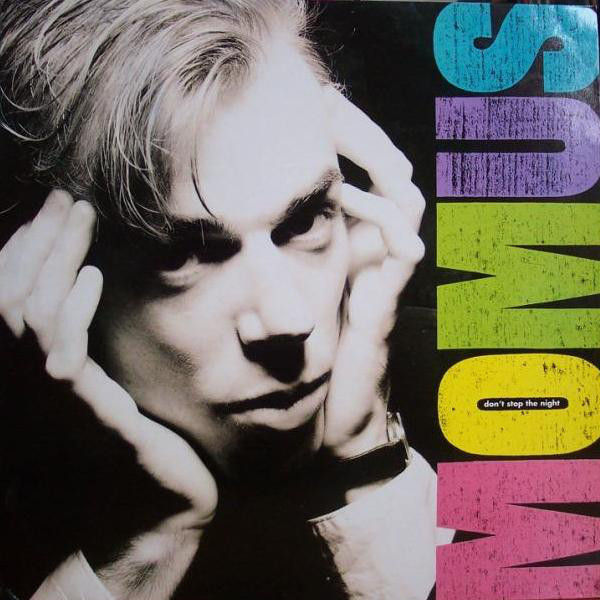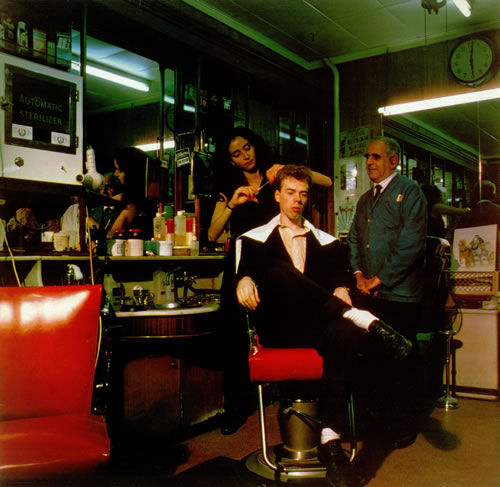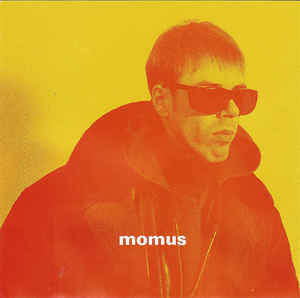I've watched all your desire... #10 Don't Stop the Night.
- John Robinson
- Oct 18, 2019
- 14 min read
Don't Stop the Night was recorded after "Hairstyle of the Devil" and "Lord of the Dance", at the Spike in London with engineer Doug Martin, and released in November 1989. The album was originally envisaged as a concept album about different forms of (mainly sexual) abuse: abuse of patients by doctors, students by teachers, the working class by the upper class etc. The album was to be called "Sexual Crimes of the Professional Classes", but in the end "Don't Stop the Night" was taken from one of the song titles. The album became a more generalised meditation on the 1980's: a final farewell to the decade's greed, overwhelming capitalism and sexual promiscuity. This is by some degree the most "British" Momus album, and the clearest stab at pop fame and fortune his career would entertain.

The cover features Momus in close up, using black and white to suggest a cold, clinical and emotionless "1980s" man, with white shirt and wristwatch. The lettering of Momus itself is large, capitalised and colourful, the back and inner sleeve have more colourful versions of Momus' face, with his hands cupped over his ears, less to hear no evil, than to hear it more clearly. The photographer is Michael Daks and the overall sleeve design by Vici Macdonald. No-one else is credited on the cd or album cover that I have. (A list of samples would have been very useful at this point!) Importantly perhaps, the lyrics are included, along with a disclaimer, "All characters are fictitious and any resemblance to persons living or dead is entirely coincidental": the effect of which is of course to immediately make you wonder who the songs are about. I'm sure that won't be an issue. Also, the CD includes the single mix of Hairstyle of the Devil, which is certainly about real people, as previously discussed.
Trust Me, I'm a Doctor
The original theme of professional misconduct is immediately apparent.
This doctor is jaded, bored, disinterested in life and sexuality and seems to be abusing his position almost out of a perverse sense of duty more than desire. He has "long since lost all interest in feelings of pleasure and pain" but while he will never feel such things again, there is "still hope for you". This is as long as the actress who is his patient pulls through, and he suggests this may work "if we operate immediately". There seems to be no hope for the Doctor himself, although he begs his patient to help him "break this frozen sea within". Given that "operate" is almost certainly a coded reference to the sexual abuse that is taking place, we are fully in the realm of the 1980's psychopath here such as Patrick Bateman or (in many people's opinion) Ferris Bueller.
Musically, this continues the theme apparent on Hairstyle of disco/techno. A strident beat is mixed with cold keyboard and piano sounds and a discordant guitar blasts accompanying chords at odds with the calm delivery of the lyrics. There's even a guitar solo, a clean and cold line scything icily through the surgery, influenced by the work of Magazine and post-punk in general, with that Detroit influence throbbing in the bass. The squelchy synth effects and R2D2 / Sooty and Sweep style clicks, beeps and whistles make the finale of the song sonically very satisfying, perhaps representing as they do the equipment the doctor has switched on for his "operation". Certainly the track as a whole feels very machine like, as if we are witnessing the very clockwork mechanism of the decade.
Righthand Heart
A remake of the song already included in acoustic form on "Tender Pervert" for the CD release, and the version Momus considers canon. A story of sexual sickness: a man so debauched in himself that he cannot bring himself to couple with a girl who has dextrocardia. This is of course because he has a right hand heart himself. Instead he watches her have sex with a boy "with no heart at all": Momus describes this new character as something like Robert Mapplethorpe's "Man in a Polyester Suit". It's funky and sample driven (from Gilbert O'Sullivan's "I'm a writer..") and the spoken sections become quite disorienting with the filters that have been applied. It sounds like the description of a million over-privileged parties in London at the time. As in many of the songs on this album, there's probably nothing more sickening on here than happens in upper class shin-digs every day. This song is purportedly akin to Prince's songs from his infamous Black album, so much a spiritual twin to this album.
Lord of the Dance
The follow up to Hairstyle of the Devil was not, in the end, released as a single, perhaps because it is lacking the hooks and the lyrical gravitas of the former. Lord of the Dance uses bhangra beats - then a more obscure sub-culture - to bolster lyrics re-inventing all religious deities as a "beautiful woman" or possibly a drag-queen who rules the world as if it were a gay disco. Both Buddhist and Christian quotations are used to illustrate the idea of religion as a nightclub: "In the beautiful fever of the disco diva / She has come to set you free". Interestingly perhaps, we are told that "ecstasy is transitory": possibly a slight dig at rave culture. The lyrics also refer to "the end of the world" and the second coming of the Messiah at Armageddon: apparently a reference to the spoken word piece "The Last Days of Mankind" by Karl Krauss.
Lifestyles of the Rich and Famous
Battle not with monsters...
Stock Aitken and Waterman were three record producers who working together had created a hit factory for the 1980s. They churned out hit after hit to a fairly set formula and sound. In 1989 alone they were responsible for 6 UK number 1 singles, including those by Jason Donovan and Sonia. They also wrote early hits for Kylie Minogue, and created the production for Dead or Alive's "You Spin me Round" amongst many others. They were, of course, heavily parodied by artists such as the Jamms/KLF ("Kylie said to Jason") and Morris Minor and the Majors ("This is the Chorus"). In Lifestyles.. Momus sought to parody and skewer the sound and more importantly the attitude of 80s music and lifestyle, by telling the story of a guy who has lost out to someone more successful, more grasping and greedy, and who can only watch while the girls flock to this horrendous winner. The opening lines immediately capture the empty existence:
"Photographs by the paparazzi Joyrides in his Maserati Invites from every arty fashion victim To every warehouse party"
The narrator is aware he has lost his girl to the new and more successful (richer) guy, but is happy to watch, perhaps thinking he deserves to lose: this is the 80s after all:
"And I've watched all your desire With fascination Watched its satisfaction".
He has been reading: Martin Amis, Brett Easton Ellis, and other key 80s texts related to sociopathic behaviour. In the chorus Momus name-checks those he believes responsible for the mess: Stock, Aitken, Waterman, Margaret Thatcher and Sigmund Freud.
"I'm wrong the world is right" becomes a key phrase, spoken contemporaneously with Thatcher's pronouncement that there is "no such thing as society". So, you are on your own, you are wrong to dislike the situation, and you had better not rebel.
And finally, "when you're up, everybody wants your babies": or rather, legal access to your money. Goodbye to the 1980s indeed...
This song succeeds astoundingly well, to the extent that it could be a SAW production. It could have been a hit! Musically it is like a postcard straight from 1989: this is exactly what was in the charts at the time. The choppy keyboards, the firework type effects, the "Rite of Spring" orchestral sample stabbing at your eardrum and the relentless chirpiness... God I hated this type of music at the time. Love this though.
How Do You Find My Sister?
There was a lot of sleaze in late 80's Britain. You could hardly pick up a paper without reading about an auto-erotic asphyxiation, a toe-sucking scandal or accusations of soliciting sex with prostitutes, usually involving arguments about what was in brown paper envelopes handed to sex workers. Members of Parliament and Bankers featured prominently in all this, and 1989 was also the year when the film Scandal was released, which focused on the Christine Keeler / Profumo affair which brought down a British government of the 60s. The Pet Shop Boys were involved in the soundtrack of that.
So this song, based on a comic song by Serge Gainsbourg, is a tale of revenge across classes. The working class narrator has raised - from birth - his sister Lulu to be an escort to the rich and famous. "Lulu" is the name of a similar character in Frank Wedekind's work known as the "Lulu" plays, where she is whipped across the stage by a ringmaster (as in this song), and she also inspired the character played by Louise Brooks in the silent film "Pandora's Box" (1929) as well as the album "Lulu" (2011) by Lou Reed and Metallica.
Lulu's first customer is Johnson - about whom we know nothing, I am sure this is not a reference to anyone we know called Johnson. Her next customer is a Tory whip called Finlayson from Woking. The MP for Woking at the time was Baron Onslow. I am sure this is not a reference to any of the various Tory MPs called Finlayson.
Once he has enough dirt on all these disgusting people, the blackmail begins, resulting in sexual depravity: "Kneel before me, kiss it, call me sir." Is he now as bad as those he is punishing? Possibly. One of the victims (of whom he quaintly has a Polaroid picture*) is a Mr. Henrik Issinger. I am sure this is not a... you know, this, possibly, is the reason for including the carefully printed lyrics and the disclaimer quoted at the start of this article.
This is a slower, still "squelchy" sounding song, with an LL Cool J sample, and shouts of "D.J." and "Ringmaster" related to the Wedekind text above. It's clearly arranged as a comic song, with "ba ba" backing vocals multi-tracked by Momus, but although comic, the character and all of his victims are horrific people, and the true victim poor Lulu, who must be "flushed out once a week by a quack down Harley Street". This ends side one of the vinyl album.
The CD includes Hairstyle of the Devil here, I assume the single mix. As discussed in the previous entry, this is a quintessential 80s pop song, which could have been a bigger hit, but understandably wasn't. It certainly fits in with the coldness of the protagonist of "How do you find my sister" and also with the perverse relationships to be found on side two of the album.
*Also timely references to Telexes and Fax Machines...
Don't Stop the Night
A new version of "Ballad of the Barrel Organist" from the first Momus EP, "The Beast with 3 Backs". It is telling that this new, commercially minded Momus feels the need to reinvent such an early song for the new paradigm. Sordid details following...
The song certainly fits with the themes of the album, featuring a threesome somewhat like that depicted in Hairstyle of the Devil, and utilising samples from 70s Disco and Sylvester to create a danceable solution to the 80s. It's remarkably cheerful sounding given the lyrics about voyeurism and cuckolding, and an intruder stares through wardrobe doors somewhat like the narrator in Pulp's Babies. The ending is particularly spritely and eminently enjoyable.
Amongst Women Only
The narrator of this song has been abandoned by his girlfriend for his "clumsy butter fingers" and "brutal masculinity", but as consolation, or revenge, or both, he fantasizes about her masturbating by herself or "Amongst Women Only". It's a song of word play with swirling string sounds that mimic the "harem full of eastern promiscuity" that she now lives in in his mind. We have - not for the first time - the sounds of a woman pleasuring herself to accompany this, as she "arouses herself to her crisis herself". It's a song which Momus describes as correcting the misogyny of previous songs, however to me it really just describes the narrator controlling his ex-girlfriends behaviour in the only way he can - in his fantasies, and in one of the most clichéd scenarios men can muster, in fact it puts me in mind of this. It's a pretty song though, and the break down in the middle while the imaginary girlfriend "goes on for hours" achieves the erotic atmosphere it aspires to.
The Guitar Lesson
Inspired by this picture of a guitar lesson painted by Balthus in 1934, where the abuser is a female guitar teacher, this tells the story of a paedophile guitar teacher and a 12 year old female student. The music is a soft arpeggio again, with a sequence borrowed from Léo Ferré's song Avec Le Temps, a song of regret at lost loves and opportunities. The music also sounds like a lesson, a practice piece deceptive in its simplicity for the student. The girl is described in terms which are quite worrying...
"Distant eyes full of space In her posture no trace of coquette No defiance"
... because this suggests she has given up resistance, that this has happened before, maybe many times. Her mother comes into the room, feels chill, perhaps sensing something is wrong, and leaves even as the student "looks forlorn". As the lesson progresses there are hints that this relationship is not quite right, as the teacher "gently corrects the curve of her back" and draws behind her ear "a few strands of hair gone astray".
After the lesson is done she shows him her bracelet, then they sit together, where the line is crossed with one of the most disturbing lyrics in pop music:
"And touching the place where her breasts will be I press my hand flat".
The girl then sits on his lap and her skirt "travels up under my palm": however she remains calm "as if listening to the distant sound of a burglar alarm" : which is replicated by synth effects at this point, a jarring noise cutting into the beauty of the underlying music and stabbing into our ears the reality of what is happening in the narrative.
The narrator then seems to be unable to describe what happened next, just that
"Now, from afar, it seems to resemble A strange composition in oil Of a man, a guitar, and an innocent little girl".
That he is aware of her innocence somehow makes the character all the more chilling: he is fully aware of the damage he is doing. The music fades out with a martial beat replacing the sound effects and keyboards, finally leaving just the arpeggio playing on a synthesized guitar, which stops abruptly.
For a potentially mainstream pop performer to sing on a topic of this nature, and to moreover place himself in the role of the abuser, is very brave or very foolish. To connect oneself to this imagery in the mind of the public you would have to have a cavalier attitude, at best, to your potential chart success: or at worst, complete indifference. I am not sure which it is in this case, but perhaps the Faustian pact that would be necessary for fame, and the requirement to write ten more "Lifestyles of the Rich and Famous"every year was no longer Momus' idea of a good time. The greater exposure to the vapidity and hypocrisy of the music industry he had by now surely experienced may have engendered a desire to bite the hand that fed him. This would certainly explain the odder lyrics on this album and (more to the point) the entire next album.
Also, note to self: when listening to the Momus album "Don't Stop the Night" on earphones do not sing along to (well, any of it) but particularly "The Guitar Lesson" whilst wandering around Aldi doing the shopping. Particularly when pushing a buggy containing a child. One gets very odd looks indeed.
There is a relatively high profile cover version of "The Guitar Lesson" by Steven Wilson (lead singer of Porcupine Tree). One of a surprising number of links between Momus and progressive rock! The cover version is from his album actually called Cover Version released in 2014 which couples various songs to Wilson's own compositions, except with this Momus song, which is linked to another cover version of the Folk song "The Unquiet Grave".
The Cabriolet
Having removed the future career option of guitar teacher, Momus, in a prescient move, went on to ensure he would never be called upon as an Uber Driver.
The Cabriolet started its life on the Samizdat demo as a daft song about Boy George. The drama and tension within the chorus and bridge lent themselves more appropriately, however, to this life and death tale. As Momus drives home from a party with a girl he is not interested in, he accidentally drives off the road and crashes his Cabriolet. The girl is good looking and he cannot explain why he does not find her as attractive as everyone else seems to. This changes after the crash. As she lies dead and he lies badly injured:
"Your face unstained, unharmed but drained pale Is suddenly more strange and beautiful than anything I've ever seen or ever will".
Finally in the extremis of death, he is able to experience something he has never felt before: "In the sudden shock of silence, with the morning star above you Lying bizarre in the wreck of my car ... ... I love you".
This statement of love is all the more shocking not only because he is in love with a corpse, but because after all the lies, cheating, abuse and perversion we have encountered on the album, this is finally genuine: he loves her, truly, and this is the most transgressive thing of all.
The music for this is beautiful, a moving chord sequence with a dramatic progression and closing fade that perfectly fits the scene that is being described.
The influences on this lyric seem to include J.G. Ballard's novel Crash (characters who are sexually aroused by/in car crashes), Warm Leatherette by The Normal, The Girl with the Patent Leather Face by Soft Cell, and Permafrost by Magazine, all of which are worth exploring.
Shaftesbury Avenue
A burst of traffic noise and synth takes us into the heart of London, where Momus is chatting us up and inviting us to a café round the corner. Of course you'd go: the trip we take through London takes us through the West End with its "Tottenham Hotspurs", "Japs and Prunes", and "Tarts with faces like the Phantom of the Opera" and on into Chinatown, onto Gerrard Street where Momus wishes he could speak Cantonese or Vietnamese in order to seduce those girls as well. More charitably, this song is about the opening up of London, and the first indication of Momus moving into the wider world. He certainly thinks that this globalisation is a positive thing. In an interview with Miranda Sawyer for Select magazine, a couple of years later in 1994, he said:
"...I get on a tube train and suddenly it fills up with all these ugly people and I think, what are all these ugly people doing and then I realise it's a football crowd. And they all have an IQ of about 80. I hate to point this out, but the bulk of football fans are stupid . They can't help it. . . they're the spawn of the industrial revolution. . . I'm going to sound like an awful geneticist*, but there's a lot of poor genetic stock around and we have to filter it and we have to interbreed so we get better and higher genetic stock. When you see people of mixed origin they're often more intelligent. They might have to learn two different languages and they have to live in two worlds and understand the cultural relativism that people just don't understand if they've grown up in one culture. People from different backgrounds should mix and their eyes would be opened."
( from http://selectmagazinescans.monkeon.co.uk/showpage.php?file=wp-content/uploads/2012/03/momus.jpg )
I'm pretty sure that to some extent Momus is deliberately setting out to shock here, and I'm not sure I would dare to say all that about football fans... but in many respects I think he is generally correct. Certainly mixing with other cultures does benefit everyone involved, as does living abroad. The far East would beckon for Momus later on, so the song seems to predict some aspects of his future in this sense.
The song is another slab of 80s pop: the chorus is a real earworm, and that orchestral hit effect is employed wholesale. This could easily be a Pet Shop Boys song, with a similar overblown production and cinematic approach. But even as he sings of Kiss FM, the BBC and British sleaze, you feel that this is a farewell to the 80s and also to this style of music.
Following the relative commercial failure of both Hairstyle of the Devil and Don't Stop the Night, Momus lost some faith with Britain and with Creation records - a mutual decline certainly. He became in his own words "an internal exile", and moved away from pastiche of current pop trends into a world more inspired by French and European artists, as well as electronic and experimental sounds. In the meantime, a compilation album was released by Creation records, which included two new tracks, and will be discussed in the next entry.
Addendum
"There's some great entertainment lined up for me on BBC1", Momus sings on "Shaftesbury Avenue". The album Don't Stop the Night was released in November 1989 and reviews were released on 4th November: coincident with the fireworks of the final song. So what entertainment was actually lined up on that fateful Saturday?
Assuming Momus went out shortly after teatime, he would have missed the following:
5.40: The Noel Edmonds Saturday Roadshow featuring Jimmy Cricket
6.25: Bob's Full House: Game Show with Bob Monkhouse
7.00: Russ Abbott: Comic Sketch Show featuring Stratford Johns
7.30: Hearts of Gold: Esther Rantzen with stories of unsung heroes and heroines.
8.10: All Creatures Great and Small: Drama based on James Herriott's novels about a vet.
9.15: Armed and Dangerous: Film about oddball couple becoming security guards starring John Candy and Eugene Levy.
10:40 Saturday Matters with Sue Lawley: Chat show with Edwina Currie**, Dorothy Lamour, Ian Hislop.
11:25: Cannon: Detective film from mid seventies.
1.00 Shutdown.
Great Entertainment?
On balance, he was probably right to go out. Taxi!
* What is the difference between Jesus Christ and a geneticist who specialises in the selective cross-breeding of ursine mammals?
One bears a cross...
** Who had an affair with soon-to-be-PM John Major around this time






Comments